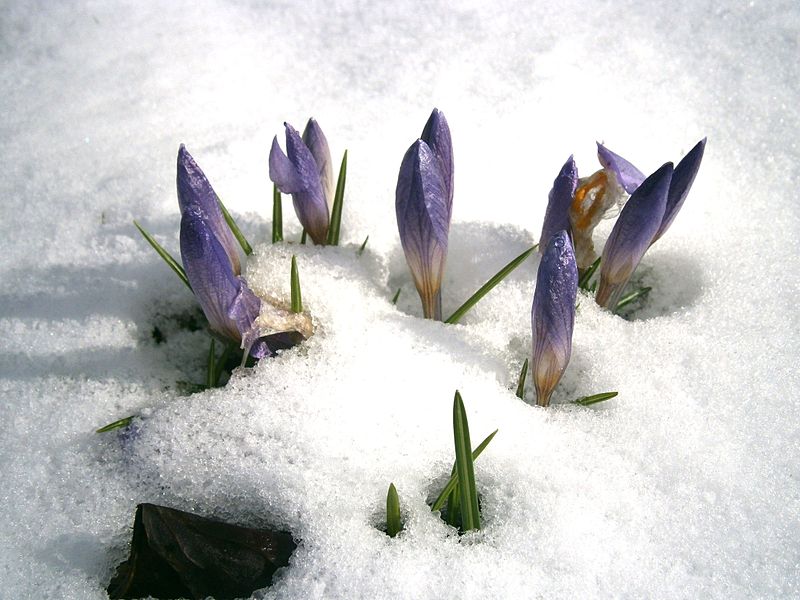 |
The crocus is one of the first flowers to bloom, about
the same time as the snowdrop and before the daffodils. Depending on the
species and the locale, crocuses can bloom in February or March. Some varieties
even bloom in autumn. As a general rule, it is what are called the species
crocuses that bloom earlier than the larger, showier Dutch or hybrid crocuses.
Regardless of variety, crocuses are always a welcome sight after a long, barren
winter.
Crocuses are easy to grow. All they need to thrive is
full sun and a well drained soil. Buy and plant corms (what the bulbs are
called) in autumn. Add organic matter such as compost, or a commercial fertilizer
made for bulbs, at the time of planting. Crocuses are hardy plants that increase year
after year. They are best planted in mass for a striking display. Since the
corms are relatively small, they are easy to tuck into the soil around existing
plants. Plant them among perennials, at the base of shrubs and trees, even in
the lawn. By the time the grass is ready for its first mowing of the season,
the leaves of the crocuses should have created and stored up enough energy to
flower again next year.
Crocuses, like so many other plants, have traveled the
world over the centuries. Originally native to the Mediterranean, North Africa
and Spain, it traveled to China with the Mongols. It arrived in England in the
sixteenth century and to the United States in 1740 when Peter Collinson of
England sent John Bartram over twenty varieties. Ancient artifacts have been discovered providing
evidence that crocuses were cultivated even in antiquity. Pottery decorated
with the image of crocuses was found in Crete which dates back to 1500 B.C. An
ancient scroll from 1552 B.C. describes the medicinal uses for crocus. There is
also mention of it in the Song of Solomon (4:14), where it is referred to as
saffron. Saffron is one species of crocus (C.
sativa) prized for the orange pollen that has been used as a seasoning and
dye since ancient times. The cost is extremely expensive as you would imagine.
It takes over 4000 crocus flowers to make an ounce of saffron.


Folklore regarding the crocus revolves around love.
According to Homer, the marriage bed of Zeus and Hera was made out of crocuses.
Ancient Greeks decorated their wedding banquets and marriage beds with crocus
petals. There is a mythological story of how Crocus was turned into the flower
he is by Aphrodite because of the love he spurned from the nymph Smilax. In
Victorian times it was believed the crocus inspired love and so was sent
between lovers. A short poem by Ella Wheeler Wilcox (1850-1919) uses the crocus
and other flowers to contrast the differences between two lovers.
“You like
buttercups, dewy sweet
And crocuses,
framed in snow;
I like roses, born
of the heat,
And the red
carnation’s glow.”
Why not give (or request) a bouquet of crocuses this Valentine’s day instead of roses?
I have very much enjoyed researching and writing about
each of our twelve flowers during this past year. I hope you have enjoyed
reading the articles.
Note: all images in this article are copyright free. I have obtained them from Wikimedia Commons. If you click on the image it will take you to the original site.


No comments:
Post a Comment
Thank your for your comment. It will be reviewed before it is published so that I can avoid spam on my blog.